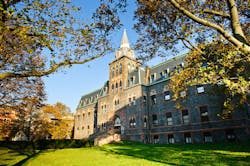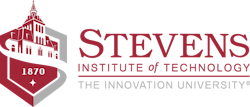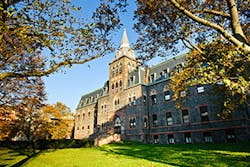Stevens Institute of Technology
Stevens Institute of Technology: President Nariman Farvardin's Fall 2015 End of Semester Address
Stevens Institute of Technology: 2015 NJTC AWARDS "KNOWLEDGE IS POWER"
Stevens Institute of Technology of Hoboken received the “Knowledge is Power” Award from the New Jersey Tech Council (NJTC) on Thursday, November 19 at NJTC’s annual ceremony to celebrate innovation, partnership and collaboration in the region’s tech industry.
Stevens Institute of Technology: The SURE House - 2015 Solar Decathlon Entry
The SURE HOUSE started with a simple question: how can we design a home which both reduces its energy use and adapts to the realities of a changing, more extreme climate. Our answer emerged as a new direction in storm resilient coastal housing. We merged the inherently efficient indoor/outdoor rooms and open floor plan of the quintessential 60’s style modern beach cottage with state of the art building science, the latest renewable energy technologies, and fiber-composite materials repurposed from the boat building industry. The result is a building armored against extreme weather that uses 90% less energy than its conventional cousins, powers itself through clean solar energy, and in the aftermath of a storm becomes a hub for emergency power to the neighborhood… all of this packaged as a comfortable, beautiful beach house.
Teaching, Transformed: Tech Plus A Human Touch Are Upgrading the Stevens Student ExperienceIn March, The Chronicle of Higher Education trained a light on a discouraging recent trend.
"Attrition is rampant," reported the Chronicle. "Nationally, only 58 percent of all first-time students who started a two- or four-year college in fall 2012 returned to the same institution the following year... [only] 69 percent returned to any college. That's a ton of missed opportunities — and lost tuition revenue."
Determined to tackle this new environment and bridge the digital gap, while still keeping its graduate and undergraduate students at the center of the learning experience, Stevens has responded with technology and ingenuity to teach differently and more effectively.
"I think we all understand, especially at a place like Stevens, that the 21st century is a century of technology, the century of innovation," noted former Intel CEO Craig Barrett, speaking at Stevens in 2014. Read More
Computer Engineering
The information technology industry is moving at a rapid pace, and computer engineers are in high demand.
The study of software, hardware, networks and security often lead to lucrative and exciting careers where computer engineers design, develop, and apply digital systems to solve modern engineering problems. Computer Engineers also work in such fields as software development, data structures and algorithms, computer communications and graphics.
At Stevens, the computer engineering program prepares students to become leaders in the field, with a focus on innovative problem-solving. Graduates with a Bachelor of Engineering in Computer Engineering often find success in industry or government, or continue their education in a graduate program.
Electrical Engineering
Electricity, electronics and electromagnetism are exciting and rapidly evolving fields that dominate today's technology-driven world. As the power and sophistication of information technology grows exponentially, electrical engineers with digital expertise are essential to commerce, government, industry, and commonplace gadgetry such as smart phones and tablets.
In addition, undergraduate students have access to world-class faculty including Institute of Electrical and Electronics Engineers (IEEE) fellows — Dr. Harry Heffes and Department Director Dr. Yu-Dong Yao. Research at Stevens is often funded by the National Science Foundation (NSF), examining a number of prominent topic areas from cognitive radio to wireless network control and security to distributed laser array synchronization.
Mechanical Engineering
The bachelor's degree in mechanical engineering at Stevens offers students a broad background in engineering and the liberal arts, with the technical skills needed to support the design, testing, and manufacture of products, systems, and devices.
Mechanical engineers are suited for employment in diverse areas, including the aerospace, automotive, biomedical, chemical, computer, communications, nanotechnology, and power-generation industries. A bachelor's in mechanical engineering from Stevens leads to high-paying jobs immediately after graduation. Graduates from the Stevens class of 2010 were offered an average of $61,050 straight out of college, more than the national average of $58,881. Mechanical Engineering ranked seventh on the National Association of Colleges and Employers 2009 list of the top 15 highest-earning college degrees.
Profile created by Penton using resources found on the university website or material provided directly from the college. The intention of these profiles is to highlight some of the top electrical/computer and mechanical engineering programs in the United States. Source:https://www.stevens.edu/schaefer-school-engineering-science


